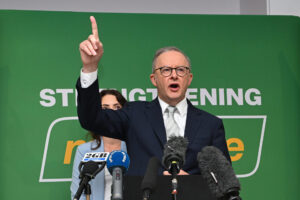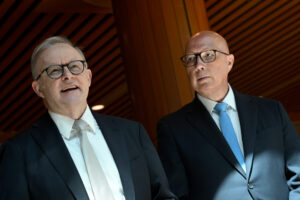In the middle of a pandemic, through the middle of a recession, Australia has undergone a secret wealth explosion.
When the national accounts were released on Wednesday, there was a collective sigh of relief. Australia was not on the brink of a double dip recession.
However, a much bigger story was missed. While everybody recognised that the June quarter’s GDP figures showed that Australia’s gross income was up 0.7%, what was not recorded is the quiet explosion of wealth happening in this country. While the real estate and business pages are full of references to booming house and share prices, as long as the GDP figures focus on national income, not national wealth, our key indicator of prosperity turns a blind eye to the asset price boom gripping the nation.
Australia’s GDP currently sits at $2 trillion dollars. Meanwhile, the wealth of Australians grew by $1.7 trillion in the last 12 months alone, right through the recession. That is the equivalent of someone who earns $200,000 per year learning that their assets had just gone up in value by $170,000 in a year.
Last year’s surge in wealth was part of a long-term trend being ignored by Australian policymakers. The wealth of Australians has grown by an extraordinary $9.5 trillion, or a whopping 302%, in the past 33 years, according to new research by Australia Institute economist David Richardson.
Earlier this year the Treasurer, Josh Frydenberg, released the Intergenerational Report (IGR) that projects spending and revenue out over the next 40 years.
It was greeted with headlines like “Intergenerational Report: OK boomer, it’s time to pay for your extravagant ways” and “Intergenerational Report’s rosy crystal ball portends budget carnage”.
When the IGR talks about how Australia is going to afford the ageing of the population it talks about GDP. But the income represented by GDP is far from the whole story, as we now know.
The income growth projected by the IGR is not small. It finds Australia’s income is going to be 80% higher (even after adjusting for inflation) in 40 years’ time than it is today. But that is only a small part of the good news story. Wealth in Australia is likely to keep growing rapidly, at least for those lucky enough to have some.
Imagine someone whose income was rising steadily and whose house had doubled in value crying poor about how they might fund their retirement. Even if they claimed to be asset-rich but income-poor, it would be hard to sympathise with their plight. But here is Australia, with one of the highest per person GDPs in the world, in the middle of a boom in its wealth, we are wondering how we might pay for the healthcare of the richest generation we have ever seen.
30 years ago, household wealth was 3.58 times the size of GDP. It is presently 6.37 times GDP and is projected to hit 14 times GDP in 40 years.
Of course, this wealth explosion is a good problem to have. Indeed, smart government wealth policies could help address two of the big issues of our age.
The wealth increase is not being spread evenly. The 10 richest Australian households have the same combined wealth as the 4 million least well-off Australians. Average household wealth has now surpassed $1 million, but it is distributed unequally. The top 20% have more than 90 times the wealth of the poorest 20% of Australians
As wealth growth outstrips income growth, inequality will inevitably grow further because wealth is distributed much more unequally than income. The IMF and the World Bank now agree inequality is one of the drivers of sluggish economic growth around the world. That is on top of the all the risks that never-ending inequality growth poses to the very fabric of our society. Indeed, unchecked inequality represents one of the fundamental threats to democracy itself.
Overall, Australia is a low tax country, the 6th lowest in the OECD. In particular, Australia taxes wealth very lightly. Australia currently has no wealth tax, no inheritance tax, capital gains are taxed at a 50% discount, and superannuation tax concessions effectively work as a reverse wealth tax—providing large tax breaks for the rich and nothing to the poor.
The COVID-19 pandemic is re-teaching us the importance of government. Whether it is a robust hospital system with enough ICU beds and health professionals to staff them; the expertise and personnel to deploy and run contract tracing; the ability for the government to produce or procure vaccinations; or the resources to run a JobKeeper-style wage subsidy program, we have been reminded why we need a stronger government.
However, the capacity for the State to deliver cannot been invented overnight. As we come out the pandemic, we are going to need a proper debate about how to secure Australia’s revenue base to build a stronger state and nation for the next big future challenges and opportunities.
The good news is that our wealth explosion provides a base from which government revenue can be secured. The current Government has an arbitrary tax cap which limits overall federal taxation levels to the equivalent of 23.9% of GDP. New calculations show that the taxation cap falls to 10.4% in 2060-61, using a comprehensive measure of income that includes capital gains.
If we store our wealth in the form of great hospitals, great universities and an economic system that is ready for a low carbon future, we will be better placed to meet the next challenges than if we let our wealthiest citizens store it in offshore bank accounts.
If managed properly, and fairly, Australia’s wealth explosion can become the foundation on which entire generations of prosperity is built – but not if it is kept a secret and not if it continues to be owned by an increasingly narrow few.
Related research
Between the Lines Newsletter
The biggest stories and the best analysis from the team at the Australia Institute, delivered to your inbox every fortnight.
You might also like
Business groups want the government to overhaul the tax system? Excellent – we have some ideas.
The landslide win by the ALP has seen business groups come out demanding the government listen to their demands despite having provided them no support, and plenty of opposition, over the past 3 years.
5 ways and 63 billion reasons to improve Australia’s tax system
With a federal election just around the corner, new analysis from The Australia Institute reveals 63 billion reasons why our next Parliament should improve the nation’s tax system.
Pay a fortune in premiums or risk losing everything – the brutal reality of Australia’s insurance crisis
Struggling families who ditch their home and contents insurance would lose three-quarters of their wealth if their home was destroyed, according to new research by The Australia Institute.



